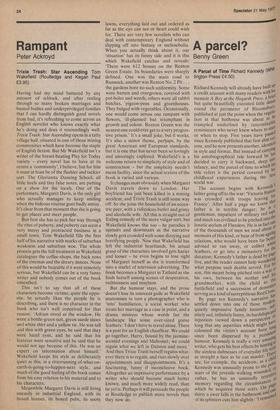Rampant
Peter Ackroyd
Trixie Trash: Star Ascending Tom Wakefield (Routledge and Kegan Paul £3.95) Having had my mind battered by any amount of schlock, and after reeling through so many broken marriages and busted bodies and underprivileged families that I can hardly distinguish good novels from bad, it's refreshing to come across an English novelist who knows exactly what he's doing and does it resoundingly well. Trixie Trash: Star Ascending Opens in a tatty village hall, situated in one of those mining communities which have become the staple of English fiction. But Mr Wakefield isn't a writer of the breast-beating Play for Today variety — every novel has to have at its centre a 'community', I believe, but for him it must at least be of the flashier and tackier sort. The Glorianna Dancing School, all little heels and tiny false notes, are putting on a show for the locals. One of the performers, Margaret Davis, is the only girl who actually manages to keep smiling when the hideous routine goes badly astray. It's clear from that moment that she is going to get places and meet people.
But first she has to pick her way through the rites of puberty, and puberty can seem a very messy and protracted business in a small town. Tom Wakefield fills the first half of his narrative with marks of suburban weakness, and suburban woe. The whole process gets the full treatment as Wakefield catalogues the coffee-shops, the back rows of the cinemas and the dreary dances. None of this would be bearable if it were remotely serious, but Wakefield can be a very funny writer and nobody comes out of the book unscathed.
This isn't to say that all of these characters become victims; quite the opposite, he actually likes the people he is describing, and there is no character in the book who isn't well conceived for that reason: 'Adrian stood at the window. He wore a bottle-green suit, green suede shoes and white shirt and a yellow tie. He was tall and thin with green eyes, he said that they were hazel eyes, and he said that his features were sensitive and he said that he would not age because of this. He was an expert on information about himself.' Wakefield keeps his style as deliberately quiet as this, in a riverrunning of-what-onearth-is-going-to-happen-next style, and much of the good feeling of the book comes from his easy relation to his material and to his characters.
Meanwhile Margaret Davis is still living uneasily in industrial England, with its boxed houses, its boxed pubs', its sooty lawns, everything laid out and ordered as far as the eye can see or heart could wish for. There are very few novelists who can deal with contemporary England without slipping off into fantasy or melancholia. When you actually think about it, our 'situation' has its funny side and it is this which Wakefield catches and reveals: 'There were 612 houses on the Renton Green Estate. Its boundaries were sharply defined. One was the main road to Runnock, another was Renton No. 2 Pit . . the gardens bore no such uniformity. Some were barren and overgrown, covered with pot-holes and weeds, others were all rabbit hutches, pigeon-pens and greenhouses. They bulged with vegetables. Occasionally, one would come across one rampant with flowers, ill-planned but triumphant in growth and colour. Renton Green was the nearest one could ever get to a very progressive prison.' It's a small joke, but it works. It's also a minor theme, perlpps, by the great American and European standards, but it is one that has never been so lovingly and amusingly explored. Wakefield's is a welcome return to simplicity of style and of construction — but the simplicity needn't mean facility, since the actual texture of the book is varied and various. It changes most obviously when Margaret Davis travels down to London. Her boyfriend has just been killed in a mining accident, and Trixie Trash is still some way off. So she joins the household of an eccentric peer, with a ridiculous butler and grimy and alcoholic wife. All this is straight out of Ealing comedy of the more vulgar sort, but Wakefield knows this too — he parodies it upstairs and downstairs as the narrative slowly gets crowded with some dizzying and horrifying people. Now that Wakefield has left the industrial heartlands, his actual grasp of the characters involved gets hazier and looser — he even begins to lose sight of Margaret herself as she is transformed into a starlet of television advertising. The book becomes a Margaret in Tatland as she finds herself among scenes of desperation, ruthlessness and mayhem.
But the humour stays, and the prose doesn't lose its innocent guile as Wakefield anatomises in turn a photographer who is 'into' humiliation, a social worker who treats her marriage as a case in point, and a drama mistress whose words fan the landscape like some over-sized goose feathers: don't have to travel alone. There is a post for an English chauffeur. We could go together, Harry, bound by the jasminescented evenings and Mahomet; we could regain what we left in Dalston and more.' And then Trixie Trash herself regains whatever there is to regain, and rises slowly over appointments and disappointments. It's a fascinating, funny if inconclusive book. Altogether an impressive performance by a writer who should become much better known, and much more widely read, than he yet is. Perhaps it will persuade the people at Routledge to publish more novels than they now do.


































 Previous page
Previous page